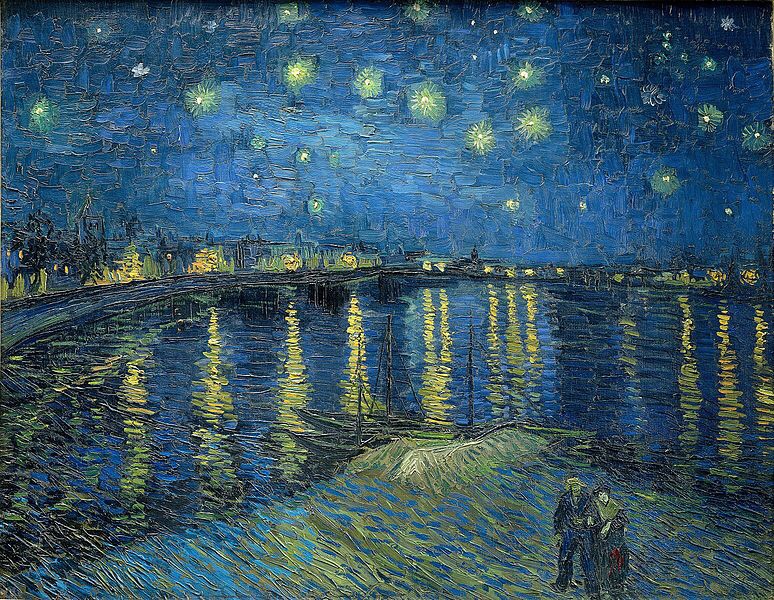
Today, in 1610 Galileo Galilei discovered the first three moons of Jupiter, which are named Io, Europa & Ganymede. One day later, Simon Marius, a German astronomer independently discovered these same moons. And then, only a few days later on January 13, Galileo discovered the 4th satellite of Jupiter.
Io: Volcanically active.
Europa: A moon of water ice.
Ganymede: Largest moon in the solar system and has its own internally generated magnetic field.
We now know that Jupiter has 53 moons that have been named. But it seems that scientists believe that there are as many as 79 moons.
Exploration is a reminder that knowledge acquisition is never at a standstill. There are more worlds to discover. I am celebrating this thought with Van Gogh and his unforgettable “Starry Night Over the Rhône.”

oops. sorry for the typos.. la computador is having some spasms and threatening to stop responding to the thumb pad. (Is that what it’s called?)
LikeLiked by 1 person
LOL. Technology remains much of a mystery to me.
LikeLike
This was SUCH an appropriate post and image for this full-moon-eclipse week! It’s always a joy to view van gogh’s work, reflect on his own personal history – and what he might have thought of a fortune teller had told him of his future and being an artist known by all levels of societies – all the way round the world.
As an artist who paints to paint, even when there are no sales, I would think that he might be even-more frustrated with the ‘why cannot it happen sooner – so I don’t have to ask my brother for help – and perhaps I cold do something for him for a change..’ Ah, one could write several novels while pondering the what if’s of history!
LikeLiked by 1 person
Those “what if” moments allow us to consider alternative lives and what may have been. We live in an existence where time is moving ever forward without the rewind options. I am fascinated by how small, seemingly insignificant choices, have great influence on the outcome of our lives. That is why I appreciated Søren Kierkegaard’s thought: “Life can only be understood backwards; but it must be lived forwards.” And speaking about novels, I believe that they are an excellent conduit for us to explore the various pathways that were placed before us. And here we are again at a new decade. Ah, the adventures call….Thank you for adding a marvelously thoughtful comment.
LikeLike
I remember your Grandfather remember his life in relationship to new inventions and new explorations. And he saw so many other astounding inventions in his life. I, too, can remember countless things that have been invented and found in my lifetime. The world has many, many marvelous surprises yet that we have no idea nor can be guess what is out there yet to be found! ! So exciting! ! !
LikeLiked by 1 person
I remember my Grandfather’s words: “I have seen the first car and a man walk on the moon. I have lived in a good time.” Even when he spoke about the Great Depression and war years, he had a spirit of gratitude.
LikeLike
What a fabulous painting, and history bit!
I love that you do that. In 2013, I posted a mural based on this painting, only I had no idea.
It’s only in the last couple of years, due to blogging, I came to realize that the mural was inspired by this painting. LOL! Maybe I learned it from you. https://graffitiluxandmurals.com/2013/05/25/starry-starry/
LikeLiked by 1 person
Thank you for the look back to 2013. Brilliant mural. And in Winnipeg, our old stomping grounds. Your words “due to blogging” resonates with me. I have found that blogging and being within an active and compassionate blogging “virtual” community has increased my potential for learning and – more importantly, integrating knowledge within other areas of my life. Exciting.
LikeLiked by 1 person
IKR!
The blogging community is fab. It’s different than Tweeting, or Gramming, or FBing..
It’s a personal preference. I find blogs are more in depth, are mostly about writing, teaching, creating and sharing. I see the other platforms more as social media. Of course there’s a social angle on WP, but it’s not the thrust.
LikeLiked by 1 person
Unforgettable indeed and what a beautiful post, Rebecca! xoxoxo
LikeLiked by 1 person
Thank you, Marina!!!
LikeLiked by 1 person
Too fond for both Van Gogh and astronomy! 😉
LikeLiked by 1 person
Ah, that is why you have such a strong creativity within you. Hugs!
LikeLiked by 1 person
Awwww….. many many hugs back and love xoxoxoxoxoxo
LikeLiked by 1 person
I like your statement “Exploration is a reminder that knowledge acquisition is never at a standstill. There are more worlds to discover.”
LikeLiked by 2 people
Have you noticed that when we explore together, there seems to be a greater understanding and appreciation of knowledge acquired? Even more important, how to integrate this knowledge within our daily lives. The question that will become even more relevant in the coming years are: who has the knowledge? And how can we share that knowledge?
LikeLiked by 2 people
A breathtaking painting to accompany such an interesting post, Rebecca! Exploration of any kind is to be commended, and that of space is astounding! And yet, it is still in its infancy!😀
LikeLiked by 2 people
My husband and I were talking about that very thing this morning over coffee. We are only at the beginning of space exploration. In one of my last conversations with my grandfather who was born in 1901 and passed in 1975, he said, “I have seen the first car and I have seen a man walk on the moon.” So much knowledge within a few short decades. Thank you so much for adding to the conversation.
LikeLiked by 2 people
It is indeed amazing what happened in those seventy odd years! 😀
LikeLiked by 1 person